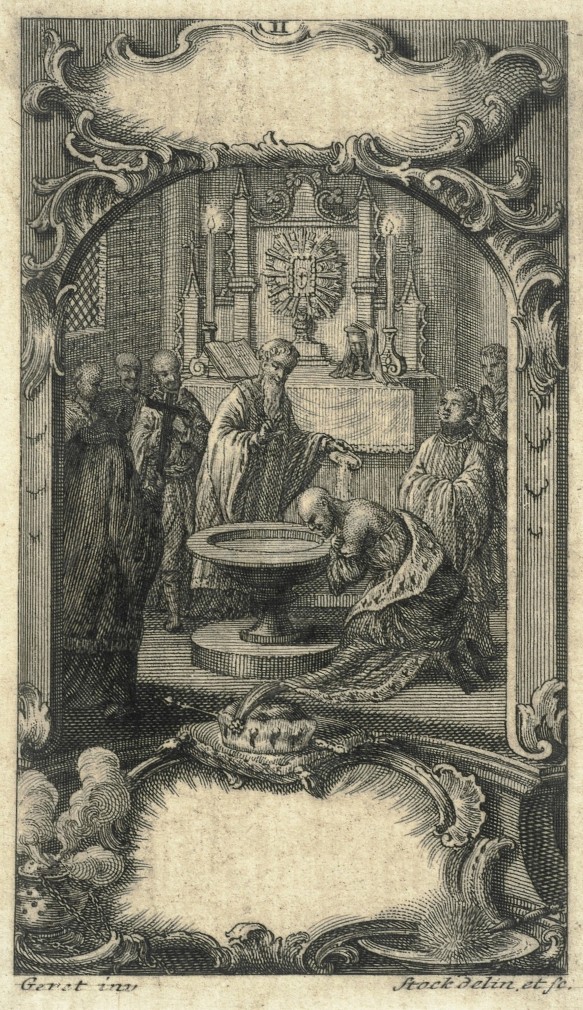
Kronika Polska (The Polish Chronicle) by Marcin Kromer, the royal secretary and later Warmia Bishop, published in Latin in 1555 under the title De origine et rebus gestis Polonorum[1], contains numerous descriptions of bloody conflicts between rulers, battles and wars that sometimes give way to comments about a surprisingly cold winter or exceptionally hot summer, or the birth of a two-headed calf. However, grand politics and the world of animals are not the only topics discussed in the Chronicle and the author tries to reach deeper into the past, searching for reasons of the afflictions tormenting the country and explaining the God's anger, manifested by the imbalance in nature, in human actions, their greed for power and lack of moderation.
The issue of marital duties in a union legitimised by the Church interests Kromer mainly in association with the inheritance of power and royal elections, which he discusses in Kronika Polska and which are inseparable from having children and from the infertility of monarchs. The Warmia Bishop attributes fertility to the faith of spouses, their morality and pious life. The role model of marital virtues are the progenitors of the Polish nation, Piast and Kepicha, whose roles in marriage were strictly defined: the man farmed the land to support his family, and once he came into power, he looked after his subjects like a good father, while his wife a virtuous woman, far from being a nuisance, was his support[2]. In return for their godliness, they were blessed with the son Siemowit.
In Kronika Polska, the woman is the one blameable for infertility in the first place: she loses her position at the court and is often expelled, but at the same time infertility is very often the effect of the man's sinful life. The Warmia Bishop uses the example of Mieszko I, who had not fathered a son with any of his seven pagan wives, but soon after accepting Christianity, dismissing his mistresses and marrying pious Dobrawa, he had a son Bolesław. Polygamy, adultery or sodomy are, according to Kromer, real obstacles to having children, and the cause and effect relationship between sin and infertility is very visible.

Typically, Kromer is much more interested in events that emphasise the negative effects of sin and he more often portrays unsuccessful marriages than happy unions. One marriage in a state of decay is the union between Ludgarda, daughter of Henry the Lord of Meklenburg, and Przemyśl II, the last of the Piast family of Wielkopolska. Ludgarda, also called Lukarda, is noted in history for the first time at the moment of her death, considered to be unnatural due to her young age. Kromer reports that Lukarda, Przemyśl's [...] wife was killed by her maids, and the cause of this act was supposedly Przemyśl himself[3], who blamed his wife for not having an heir. The chronicler condemns such demeanour, stating it is unjust to claim that it is in human capacity, rather than as a result of God's blessing, to have children[4]. The history showed that the fault was rather on Przemyśl's part, as he had "only" a daughter with his second wife, Richeza Elizabeth of Sweden.
The chronicler does not avoid telling stories, where the man is guilty for lack of an heir, as was the case with Leszek the Black and Gryfina, daughter of Rościsław, Duke of Halicz, Lord of Slawonia. The marriage, arranged by Bolesław the Chaste, who owed his nickname to his white marriage with Kinga, daughter of the King of Hungary, was only saved thanks to Bolesław's mediation. Before that, Gryfina disclosed information about Leszek's impotence accusing her husband in public of his cold blood and disabled members, she replaced her married woman's cap for maiden attire and was completely separated from her husband for four years[5]. The husband, who failed to perform his marital duties, was ridiculed in public and Kromer leaves no doubt that the wife also has the right to have her heeds and the desire to have children satisfied. After Leszek's death, Gryfina went to live in the monastery whose prioress was the above mentioned Kinga and she also looked after the orphaned daughter of Przemyśl II, Ryksa. Kromer, otherwise so critical of restless women, does not deprive either of these women of their right to shape their own life or to demand that their husbands fulfil their duties. As you can see, in Kromer's chronicle, not only a woman may be an obstacle to a man, but sometimes also the husband prevents his wife from being happy.
[1] German translation Mitnächtischer Völckeren Historien, Bazylea 1562, in Polish Kronika Polska, Krakow 1611 (here quoted from the second edition, Sanok 1857).
[2] Kronika Polska, p. 84.
[3] Ibid, p. 510.
[4] Ibid.
[5] Ibid, p. 492.
Translation: Lingua Lab
We would like to inform that for the purpose of optimisation of content available on our website and its customisation according to your needs, we use information stored by means of cookies on the Users' end devices. You can control cookies by means of your Internet browser settings. Further use of our website without change of the browser settings means that you accept the use of cookies. For more information on cookies used by us and to feel comfortable about this subject, please familiarise yourselves with our Privacy Policy.
✓ I understand